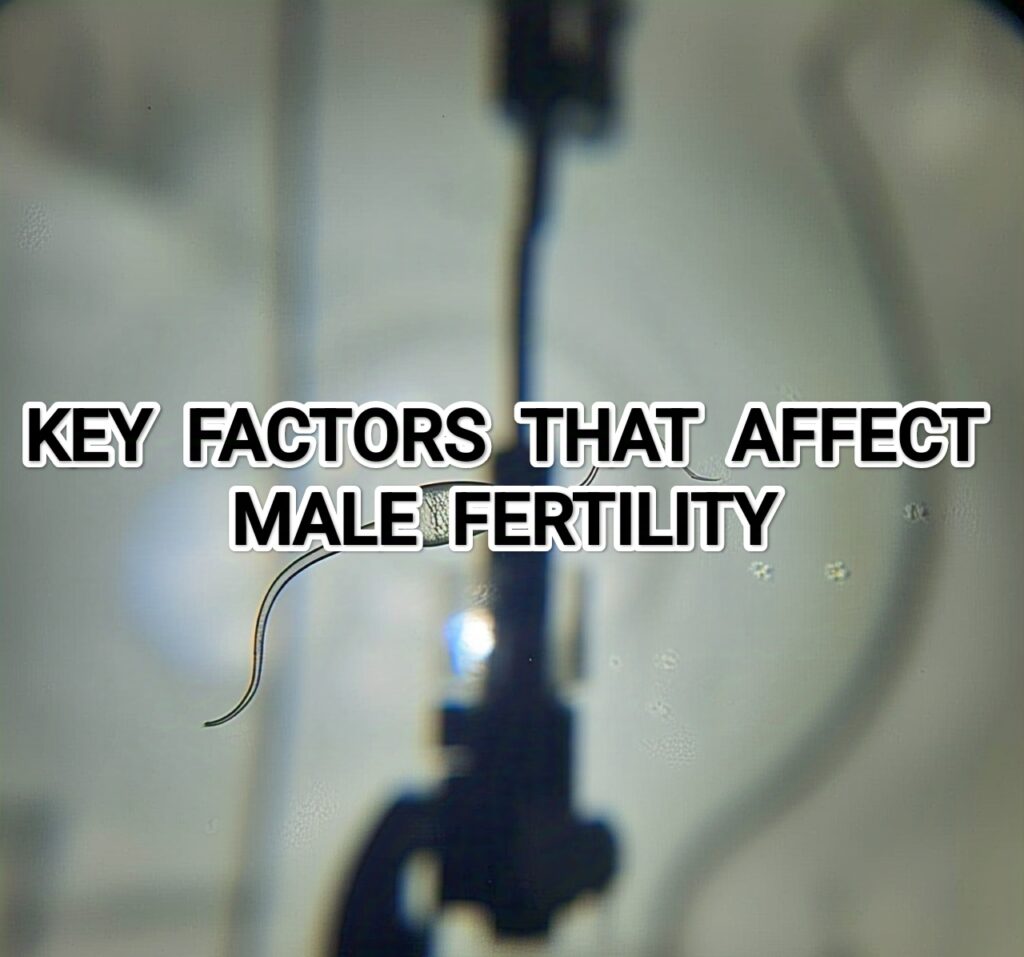Discover Mastering Sperm Health: Key Factors That Dramatically Affect Male Fertility and How to Improve It Naturally. Learn the top causes of low sperm quality and powerful natural methods—including lifestyle changes and the Action Plus SPERM BOOSTER Combo (Faforon + Spidex 18)—to boost male fertility and overall reproductive health.
Male fertility is a key part of conception, yet often overlooked in discussions around reproductive health. Sperm health — including sperm count, motility (movement), and morphology (shape) — plays a vital role in a man’s ability to father children.
WHAT IS SPERM HEALTH?
Sperm health refers to the overall quality and functionality of a man’s sperm, which directly affects his fertility and ability to father a child. Sperm health is measured by several critical factors:
- Sperm Count: This refers to the number of sperm present in a given sample of semen. A healthy sperm count is typically 15 million or more sperm per milliliter of semen. A low count can reduce the chances of fertilizing an egg.
- Motility: This is the sperm’s ability to move actively and efficiently. Healthy sperm must swim through the female reproductive tract to reach and fertilize an egg. At least 40% motile sperm is considered normal.
- Morphology: This refers to the shape and structure of the sperm. Healthy sperm have an oval head and long tail. Abnormally shaped sperm may have difficulty penetrating and fertilizing an egg.
- Volume and Semen Quality: The fluid that carries sperm should be of a healthy volume (about 1.5–5 mL) and consistency. Low volume or poor quality can negatively affect fertility.
For conception to occur, sperm must be healthy in all these areas. Poor sperm health can lead to infertility, which affects 1 in 6 couples, with male-related factors contributing to about 50% of cases.
WHY IS SPERM HEALTH IMPORTANT?

Sperm health is crucial not just for fertility, but as a broader indicator of a man’s overall reproductive and systemic health. For couples trying to conceive, the quality of sperm plays a pivotal role in achieving pregnancy, influencing both the likelihood of conception and the health of the future baby. Let’s break down why sperm health is so important, covering its biological, reproductive, and even psychological implications.
🔹 1. Sperm Health Directly Affects Fertility
Sperm health determines whether a man’s sperm can reach, penetrate, and fertilize an egg. Without healthy sperm, natural conception becomes significantly more difficult or impossible.
Key Factors:
- Sperm Count: A higher number of sperm increases the chances that one will reach and fertilize an egg.
- Sperm Motility: Poor movement prevents sperm from reaching the egg.
- Sperm Morphology: Misshapen sperm may be unable to fertilize the egg effectively.
- Semen Volume: This affects sperm transport and protection in the female reproductive tract.
If any of these factors are compromised, fertility is reduced, even if a man seems otherwise healthy.
🔹 2. Influences the Health of the Baby
Emerging research shows that poor sperm health may not only affect whether conception happens, but also:
- Genetic quality passed on to the child
- Risk of miscarriage
- Child’s risk of developmental or health issues later in life
Sperm DNA damage, often caused by oxidative stress, age, or environmental factors, may lead to chromosomal abnormalities or epigenetic changes in the offspring.
🔹 3. Reflects Overall Health
Sperm production is a complex biological process that relies on a balanced hormonal system, a healthy body, and proper function of multiple organs. Poor sperm quality may be an early sign of underlying health conditions such as:
- Hormonal imbalances (e.g., low testosterone)
- Chronic stress or inflammation
- Diabetes or obesity
- Nutrient deficiencies (e.g., zinc, selenium, folate)
- Exposure to toxins or endocrine disruptors
In fact, many doctors now view sperm health as a “biomarker” of male wellness, meaning it can reveal deeper health issues even before symptoms appear.
🔹 4. Emotional and Psychological Impact
Struggling with fertility can be emotionally taxing. For men, discovering they have poor sperm health can lead to:
- Stress, anxiety, and depression
- Strained relationships or marriage difficulties
- Reduced self-esteem and confidence
- Feelings of guilt or inadequacy
Improving sperm health through lifestyle changes or supplementation can not only boost fertility but also improve a man’s mental and emotional well-being.
🔹 5. Important for Assisted Reproductive Technologies (ART)
Even for couples using fertility treatments such as:
- Intrauterine Insemination (IUI)
- In Vitro Fertilization (IVF)
- Intracytoplasmic Sperm Injection (ICSI)
…sperm quality remains critical. Healthier sperm increase the success rates of these procedures, reduce the need for repeat cycles, and improve embryo quality and pregnancy outcomes.
🔹 6. Prevention Is Better Than Cure
Focusing on sperm health early in life, especially for men planning to have children later, is essential. Many causes of infertility — like poor diet, alcohol use, and environmental toxins — can be avoided or managed with education and early action.
KEY FACTORS THAT AFFECT MALE FERTILITY

Male fertility is determined by the ability to produce healthy sperm in sufficient quantities and deliver it effectively to fertilize a woman’s egg. When fertility is impaired, it becomes more difficult for a couple to conceive naturally. Male factors are responsible for at least 40–50% of infertility cases worldwide. Understanding what affects male fertility is essential for prevention, diagnosis, and treatment.
Below are the major factors that influence male fertility, explained in detail.
🔹 1. Sperm Quality and Quantity
The foundation of male fertility lies in sperm health, which is assessed through:
- Sperm Count: The number of sperm in a semen sample. Low count = fewer chances of fertilization.
- Motility: The sperm’s ability to swim toward the egg. Poor motility makes fertilization difficult.
- Morphology: Refers to the shape and structure of sperm. Abnormal shape = lower success in egg penetration.
- Volume: The amount of semen. A healthy volume is crucial for sperm delivery and protection.
Poor sperm quality can result from several internal or external influences, many of which are discussed below.
🔹 2. Hormonal Imbalances
Sperm production is regulated by a delicate hormonal balance involving:
- Testosterone
- Luteinizing hormone (LH)
- Follicle-stimulating hormone (FSH)
- Prolactin
Disruptions in these hormones — due to stress, obesity, tumors, thyroid issues, or pituitary gland disorders — can impair sperm development and reduce sexual function.
🔹 3. Lifestyle Choices
Everyday habits can have a major impact on male reproductive health:
🚬 Smoking:
- Lowers testosterone levels
- Damages sperm DNA
- Reduces motility and count
🍷 Alcohol:
- Excessive drinking reduces sperm quality
- Impairs liver function, which disrupts hormone regulation
💊 Drug Use:
- Anabolic steroids, marijuana, cocaine, and opioids all damage sperm production and hormone levels
🍔 Poor Diet:
- Diets high in processed foods, sugar, and unhealthy fats lead to inflammation and oxidative stress, harming sperm
🛋️ Physical Inactivity:
- Increases body fat and lowers testosterone
- Sedentary lifestyle is linked to lower fertility
Regular exercise, a balanced diet, and limiting harmful substances are crucial for maintaining fertility.
🔹 4. Obesity
Being overweight or obese has a multi-layered impact on male fertility:
- Disrupts hormone production (lowers testosterone, raises estrogen)
- Increases scrotal temperature (which harms sperm)
- Promotes oxidative stress and inflammation
- Linked to erectile dysfunction and reduced libido
Even modest weight loss can lead to marked improvement in fertility and sperm quality.
🔹 5. Heat Exposure
Sperm are extremely sensitive to temperature. Prolonged exposure to heat can impair sperm development:
- Frequent use of hot tubs, saunas, or heated car seats
- Wearing tight underwear that raises scrotal temperature
- Placing laptops on the lap for long periods
Keeping the scrotal area cool helps maintain optimal sperm production.
🔹 6. Environmental Toxins and Pollutants
Exposure to certain chemicals and toxins in the environment can significantly damage sperm:
- Pesticides and herbicides
- Heavy metals (lead, cadmium, mercury)
- Industrial chemicals like phthalates, BPA (in plastics), and solvents
- Radiation or prolonged exposure to electromagnetic fields
These toxins can reduce sperm count, cause DNA damage, and disrupt hormonal balance. Men working in agriculture, manufacturing, or laboratories must take extra precautions.
🔹 7. Age
Although men can technically father children at older ages, fertility declines gradually after age 35:
- Sperm motility and volume decrease
- Risk of sperm DNA damage increases
- Greater chance of passing on genetic mutations
This age-related decline also affects pregnancy outcomes and the health of future children.
🔹 8. Medical Conditions
Several health issues can negatively affect male fertility:
- Varicocele: Enlarged veins in the scrotum that overheat and damage sperm
- Infections: STIs (like chlamydia or gonorrhea) or mumps can cause testicular damage
- Diabetes: Can affect hormone balance and lead to erectile dysfunction
- Autoimmune disorders: Where the body attacks its own sperm
- Cancer and treatments: Chemotherapy and radiation can severely impair sperm production
Proper management and treatment of these conditions are essential for restoring fertility.
🔹 9. Oxidative Stress
This occurs when there’s an imbalance between free radicals (harmful molecules) and the body’s ability to detoxify them with antioxidants. Oxidative stress:
- Damages sperm DNA
- Affects motility and morphology
- Increases the risk of infertility and miscarriage
Men with poor diets, chronic illness, pollution exposure, or smoking habits are more prone to oxidative stress.
🔹 10. Psychological Stress
High stress levels impact the hypothalamus, the brain region responsible for hormone regulation. Chronic stress can lead to:
- Decreased libido
- Reduced sperm production
- Erectile dysfunction
- Hormonal imbalances
Practices like meditation, exercise, and counseling can reduce stress and improve fertility outcomes.
Male fertility is influenced by a wide range of controllable and uncontrollable factors. The good news? Most fertility issues can be improved with lifestyle changes, proper nutrition, targeted supplementation, and medical support where necessary.
Men hoping to improve their chances of conception should:
- Adopt a healthy lifestyle
- Avoid harmful exposures
- Stay informed and proactive
Fertility is not just about reproduction — it’s also a window into overall male health and vitality.
NATURAL WAYS TO IMPROVE SPERM HEALTH
Taking control of your lifestyle and environment can dramatically improve fertility. Here are proven strategies:
- Eat antioxidant-rich foods (berries, spinach, nuts, seeds)
- Exercise regularly, but avoid overtraining
- Manage stress through mindfulness, yoga, or therapy
- Avoid heat exposure to the groin area
- Limit alcohol and quit smoking
- Get enough sleep (7–8 hours per night)
- Take high-quality natural supplements
And speaking of supplements, one of the most powerful combinations available today is the:
⭐ ACTION PLUS SPERM BOOSTER COMBO PACK

Featuring: FAFORON + SPIDEX 18
This specially formulated combo is designed to naturally treat male infertility and low sperm count, while also improving overall male reproductive health.
🔹 FAFORON
A potent organic supplement known to:
- Detoxify the body
- Rejuvenate testicular cells
- Improve sperm count and morphology
- Support overall male hormone balance
🔹 SPIDEX 18
A premium fertility-enhancing supplement that:
- Boosts testosterone production
- Enhances sperm motility and vitality
- Improves libido and sexual performance
- Fights oxidative stress in the reproductive system
✅ WHY CHOOSE THE ACTION PLUS COMBO?
- Boost Your Vitality
- Enhance Your Sperm Health
- The Ultimate Combo for Male Health
- Unlock Your Potential Naturally
Whether you’re trying to conceive or simply want to improve your reproductive wellness, the Action Plus SPERM BOOSTER COMBO PACK offers a safe, effective, and holistic solution.
Final Thoughts
Male fertility challenges are real — but they’re not a life sentence. By understanding the factors that influence sperm health and taking natural, proactive steps, you can transform your reproductive future.
Don’t wait for tomorrow — start improving your sperm health today with the Action Plus SPERM BOOSTER COMBO PACK featuring Faforon and Spidex 18.